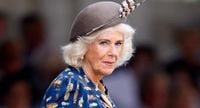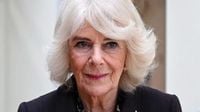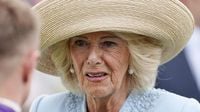Britain’s Queen Camilla is no stranger to the spotlight, but a new revelation from an upcoming book has cast her in a different light—one not of royal ceremony, but of personal courage and resilience. According to multiple British media outlets including the BBC and the Associated Press, the Queen consort fended off an attempted indecent assault as a teenager by using her shoe as a weapon, a story that’s both harrowing and unexpectedly empowering.
The incident, now making headlines across the UK, occurred in the mid-1960s when Camilla, then known as Camilla Shand and aged just 16 or 17, was traveling alone on a train bound for London’s Paddington Station. As detailed in "Power and the Palace," a soon-to-be-released book by Valentine Low, former royal correspondent for The Times of London, a man sitting next to the young Camilla attempted to grope her. Rather than freeze or flee, Camilla remembered her mother’s advice for such situations. She swiftly removed her shoe and struck her attacker in the groin with the heel.
“Camilla said, ‘I did what my mother told me, I took my shoe off and whacked him in the nuts with the heel,’” Low recounted to the BBC, sharing the Queen’s own words as relayed to former Prime Minister Boris Johnson. When Camilla arrived at Paddington, she found a man in uniform—likely a police officer or railway staff member—and reported the incident. The man was arrested shortly after, a fact confirmed by several news outlets including CityNews Halifax and The Daily Telegraph.
This revelation, though shocking, has been met with widespread admiration in the British press. Headlines have ranged from the straightforward—“Queen fought off sex attacker” in The Daily Telegraph—to the more sensational, with The Sun declaring, “Camilla whacked groper in goolies.” The story, published in advance of Low’s book release later this month, has added a new dimension to Camilla’s public persona: that of a woman with a no-nonsense approach and a sense of grit that has often been attributed to her role in the royal family.
But the story’s impact goes beyond the tabloids. As the BBC and other sources note, Camilla has become an outspoken advocate for victims of domestic violence and sexual assault. She is a patron of SafeLives, a charity supporting survivors, and has visited women’s refuges and rape crisis centers across the UK and internationally. Her public speeches—some of which have been described as powerful and deeply empathetic—reflect her commitment to destigmatizing victims’ experiences and encouraging survivors to come forward.
In a 2020 speech, Camilla said, “Through my work, I have talked to many women who have lived with coercive control and domestic violence and, thankfully, come out at the other end as the victors not the victims. They are some of the bravest people I have ever met. Their stories are harrowing and have reduced even the toughest of their listeners to tears. That is why it is so vital that these survivors should no longer feel any shame or any blame.”
Earlier this year, at a reception for SafeLives at Clarence House, she reflected on how much had changed in a decade: “I would not be standing here if it was 10 years ago because we wouldn't have been talking about it—it was a taboo subject. Nobody actually wanted to talk about it. But now 10 years later we've got survivors telling their story who years ago would've been too ashamed to come forward to tell their stories, but now they'll get up and talk and inspire others to talk.”
Despite the personal nature of her own experience, sources close to the Queen emphasize that Camilla has not previously spoken publicly about the attack. According to Valentine Low, this was a deliberate choice: “She didn’t want to draw attention to her at the expense of their experiences.” The Queen believed that her own ordeal, while upsetting, was less severe than what many other women and girls have suffered. Her commitment to advocacy, these sources say, was not spurred by this single incident but grew out of years of listening to survivors’ stories and witnessing their courage.
The story first surfaced in public discourse when Camilla recounted the episode to Boris Johnson in 2008, while he was serving as Mayor of London. Johnson’s former aides have since suggested that the incident may have shaped Camilla’s later interest in supporting victims of abuse, though those closest to her maintain that her advocacy stems from a broader, deeply rooted empathy rather than a single formative event.
Buckingham Palace, true to form, has declined to comment on the report, neither confirming nor disputing the details. Still, the lack of denial has only fueled further discussion in the press and among the public. Royal sources have expressed hope that the attention brought by this story might help destigmatize experiences of sexual assault—something that, sadly, far too many young women still endure today.
The publication of "Power and the Palace" is expected to draw even more attention to the intersection between the monarchy and Britain’s political life. Beyond Camilla’s story, the book reportedly includes new details about the late Queen Elizabeth II’s views on Brexit, suggesting that she was a “reluctant remainer,” as Low put it to the BBC. The book also explores the careful political navigation of Prince William, especially in his work on homelessness, highlighting the royal family’s ongoing efforts to remain above the political fray while still engaging with pressing social issues.
The British media’s coverage of Camilla’s revelation has been almost universally supportive, lauding her resourcefulness and sense of responsibility. “Not only was she resourceful and strong, she was a responsible citizen in making sure the man was arrested,” said one report, echoing the sentiments of many commentators. The story has also prompted broader conversations about the importance of self-defense, the value of speaking out, and the role of public figures in supporting survivors of abuse.
For many, Camilla’s story is a reminder that even those in the highest echelons of society are not immune to the threats faced by women everywhere. Her decisive action as a teenager—whacking her attacker with a shoe, reporting him to authorities, and ensuring his arrest—serves as an example of personal courage and civic responsibility. As the UK continues to grapple with issues of gender-based violence, her experience resonates not just as a tale from royal history, but as a call to action for all.
With "Power and the Palace" set for publication later this month, the public’s interest in both the personal and political lives of the royal family shows no sign of waning. For Queen Camilla, the story of a single, terrifying moment on a train decades ago has now become a testament to her strength—and a powerful addition to her legacy.






